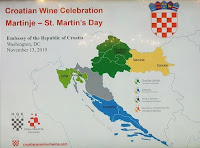"When I came to America in August 1958, I saw vineyards around Chateau Souverain and I was interested to know which grapes were grown there. They told me Cabernet Franc from France and Zinfandel, but no-one knows where those grapes came from. .... These Zinfandel grapes reminded me of the Plavic Mali grapes from my homeland in Croatia. ... I contacted Dr. Carole Meredith to tell her that I believed Zinfandel, Italian Primitivo, and Croatian Plavic Mali were the same grape. " Miljenko "Mike" Grgich addressing the First International Conference on the Tribidrag VarietyGrgich's instincts were close. The idea that California Zinfandel was equivalent to Italian Primitivo was also proposed by UC Davis professor Austin Goheen and Wade Wolfe in the 1960s. Goheen visually inspected Primitivo from Puglia (Southern Italy) and considered them identical whereas Wolfe used isozyme analysis to strengthen that hypothesis. But it wasn't until 1995, after three years of DNA analysis, when Dr. Carole Meredith, Professor at UC Davis, concluded that Zinfandel and Primitivo were, in fact, the same grape variety.
 |
| Courtesy of Rizman Winery |
Well, not so fast my friend. Croatia's southern neighbor Montenegro claims that distinction based on the Montenegrin autochthonous grape Kratosija which is genetically identical to Tribidrag. Montenegrin wine enthusiast Vlado Nikaljević presents an intriguing argument that the grapes provided to the Vienna World Fair that eventually became the foundation for California Zinfandel came from Montenegro and "Venetian archives show that the Statute of the Venetian Budva mentions Kratošija 60 years before the Tribidrag references". (Montenegro - the True Homeland of Zinfandel)
Thus, Zinfandel's homeland is - to be continued....
 In the meantime, a second wave has taken Croatian Tribidrag to California. Ridge Vineyards, among other California wineries, planted Croatian selections in their Lytton Springs vineyard. They will label wine from these grapes Croatian Zinfandel since the TTB doesn’t recognize Zinfandel and Tribidrag as synonyms. Expect an update on these wines soon.
In the meantime, a second wave has taken Croatian Tribidrag to California. Ridge Vineyards, among other California wineries, planted Croatian selections in their Lytton Springs vineyard. They will label wine from these grapes Croatian Zinfandel since the TTB doesn’t recognize Zinfandel and Tribidrag as synonyms. Expect an update on these wines soon.This evening I just finished sipping a Dalmatian made Croatian Tribidrag - the 2016 Rizman Winery Tribidrag ($45) - available for purchase through Croatian Premium Wine Imports. The wine includes 15% Tempranillo and is sourced from the winery's organic vineyards in the Komarna winegrowing area between Split and Dubrovnik. The south-facing slopes are steep and comprised of limestone soils. The result is a chalky old world styled wine with linear fruit, approachable and chewy tannins, and lengthy acids.
The Ridge Lytton Springs Tribidrag apparently has a similar structure -- particularly the strong acidity.
During this CV pandemic, Croatian Premium Wine Imports is conducting weekly Wednesday night virtual chats and this Rizman is the focus on the chat for tomorrow April 15th. (Funny when I wrote that final date, I immediately panicked about my taxes.) Hope to see you online at 8pm ET. Cheers.





